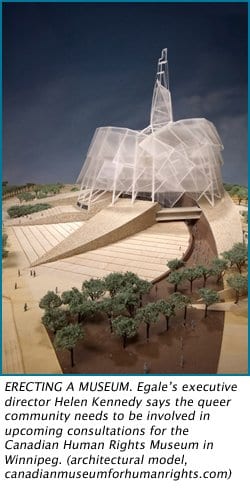For a museum that isn’t set to open for at least three years, the human-rights museum being planned for Winnipeg has already sparked plenty of controversy.
The Canadian Human Rights Museum will be the first federal museum to be created in 40 years and is billing itself as “the largest human-rights centre in the world.” This has left many wondering who will decide which human rights issues will go into the Museum and how it will be representative of Canada’s diverse population.
This past February, Canadian Heritage — which is now overseeing the direction of the museum — commissioned an online survey and public forum to gauge public attitudes about its scope and focus. More than 2,500 people across Canada responded to this survey, which consisted of 11 multiple-choice and open-ended questions.
This had some lobby groups, such as REAL Women of Canada, encouraging their members to use the online survey as a way of keeping representations of some human rights off the table. In a Feb 18 alert to its membership, REAL Women warned that the museum’s “left-wing” advisory committee consisted of “feminists, homosexuals and regular Liberal stand-bys” who want to use the museum “as a powerful tool to champion the Liberal government’s interpretation of human rights.”
REAL Women vice-president Gwen Landolt says her group wanted its members to participate in the survey to prevent the museum from catering to what REAL Women calls “trendy” human rights issues such as abortion and same-sex marriage.
“Many of us don’t agree with same-sex marriage”, Landolt tells Xtra.ca. “It is not a human right nor does it involve a question of equality. [Same-sex marriage] is not universally accepted and it would be damaging if it were pushed on everyone [in the Human Rights Museum].”
Landolt does not know how many of her supporters were counted among the 2,500 respondents who filled out the survey between Feb 5 and Mar 15.
Results from the public consultation released on Mar 31 suggest that 4.9 percent of respondents believe sexual orientation is a topic that should be included in the CMHR’s programming.
In comparison, 16.1 percent of respondents believe the treatment of Aboriginal peoples in Canada should be included in the Museum — an issue which topped the list of suggested human rights issues. Second and third were the topics of genocide and women’s rights, weighing in at 14.8 percent and 14.7 percent respectively.
It’s not clear what influence the survey will have on choices. The driving force behind the museum downplays its influence. “The online consultation was not scientific; rather it was a useful tool to help gauge passion and interest of Canadians in the Museum,” says Gail Asper, a lead member of the advisory committee that oversaw the consultation. Asper is the daughter of late media-mogul, Izzy Asper, whose life-long dream was to see the realization of a Human Rights Museum in Winnipeg.
Asper iterated that “at no time did the committee consider that the space allocation in the museum might be a function of the number of emails received on a particular topic or issue.” In fact, she says, “it underscores the need and importance of an impartial process to gather information.”
But Heritage Canada seems to put more stock in the online survey’s results. Spokesperson Charles Drouin says the public consultation “will [act as] a very good guide to the direction of the Museum.”
Drouin would not comment on any other details about what is to be included in the CMHR. That decision “will be made by the board of trustees which is to be selected by Canadian Heritage in the near future.”
Helen Kennedy, executive director of queer lobby group Egale Canada, hopes that there will be representation from the queer community in future consultations. And she wants a representative from the community to sit on the upcoming board.
“There needs to be a full and open consultation with the queer community,” says Kennedy, who adds that it is extremely important that groups like Egale are involved in the process.
“We would expect to have a place at the table — having our struggles included in the museum is part of the development of Canada’s history.”
The museum’s fate rests in the hands of the federal Conservative government, which recently committed $249 million in federal funding to help build it and an additional $22 million per year in operational funding.
What human rights issues will end up in the museum may depend on who is chosen to be on the board of trustees and the extent and diversity of future public consultations. Clearly, the notion of what constitutes a universal human right will still be up for debate — one group’s triumph will surely be interpreted as another group’s tragedy.

 Why you can trust Xtra
Why you can trust Xtra


